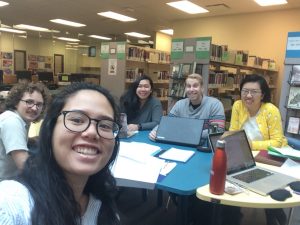The English classroom can be a platform for current events and social justice issues. There are a lot of multi-modal resources to use in an English classroom (social media, videos, novels, short stories etc.) that can spark debate and expose students to injustices in the world. However, it is difficult to start implementing this social justice lens, especially as a new teacher. Here are some things I’ve kept in mind when planning to add social justice into my English classroom:
Be Passionate & Be Involved
In order to spark any students in wanting to learn about the content provided to them, the teacher themselves has to be passionate about the issue. Even more important than that, you have to show your involvement with the issue. Ask yourself, if this is an issue I want my students to be interested in, what are the ways that I can prove I’m passionate about this topic? Have I been involved in any community events lately? How have I appropriately engaged with this issue? Why am I teaching this issue?
Example
If you are passionate about SOGI rights and policies, find opportunities to support the LGBTQ+ community within your school. Demonstrate what it looks like to be an ally and implement ways to show that within your classroom and lessons. Students know when something matters to you and will be able to connect with the lesson if you show your passion and involvement.
Do your research
 Students soak up everything like a sponge. Your classroom is a powerful platform which means you need to be careful in what you teach. Do your research on both sides of every argument. Be prepared to engage in all perspectives and understand the complexity of the social justice issue within the global context. What we do not want to teach our students is that it any issue is a one-way street with easy solutions.
Students soak up everything like a sponge. Your classroom is a powerful platform which means you need to be careful in what you teach. Do your research on both sides of every argument. Be prepared to engage in all perspectives and understand the complexity of the social justice issue within the global context. What we do not want to teach our students is that it any issue is a one-way street with easy solutions.
Example
Rather than going to pick up garbage at a park and patting ourselves on the back, find ways to research with your students about the effects of plastics on the environment. Find the benefits AND the downsides of the #plasticfree trend.
Furthermore, in an English classroom, you can relate complex issues back to the text (novel, podcast, etc.) and characterization, and the understanding of the complexity of people. People are complex therefore they contribute to complex issues.
Open up a safe conversation
up a safe conversation
Use your voice as a guide to their conversation. Allow a safe space for everyone to speak and explore ideas or burning questions. Remind your students about the etiquette when talking about touchy subjects. Demonstrate what respect looks like not just for their peers but the people involved in the injustice. The aim is not to encourage the concept of “Us vs Them” which may result in distancing oneself from the issues. It could be very detrimental if your students came home even more disconnected from the people who are directly involved in the topics you have discussed.
Example
When teaching about special education and diversity rights, educators should not tokenize or separate the classroom students from the world. Present the interconnectedness of diversity rights as human rights, and how it affects their own lives. Humans should care about other humans.
Channel their curiosity
In order to spark their interest, students need to be involved. Create a project that they can pour their own research and passion into, then let them share it. There is something effective in supporting students to tackle inquiry-based learning. A curious mind is a strong and growing mind, especially when they are able to contribute to something bigger.
There are multiple ways to channel curiosity and hook students in. One very effective way is through simulation. If you involve students in the learning and show them through concepts, stories, and metaphors that they can connect with, it can spark their attention and their passion. If our goal as educators is for our students to believe in the issues and its complexity, then we cannot just tell them, we have to involve them so that they can actually feel something.
Example
Create a simulation in class before starting a unit about Privilege. Then guide them through a project about the issue. In this unit, create a project that involves research and action. Give time to present their research to the rest of the class or to the rest of the school through a gallery walk or mini Ted Talk. Have them make sure they add their personal perspective and connection with the project. How did they get involved or interested in this topic? What can they take away after the project is over? What else are they curious about?
Make Local Connections
Lastly, although there are so many issues throughout the world, sometimes it can get really overwhelming for students. Find ways to look at local issues and relate it back to the content in your English classroom. This way, they can feel connected to the social justice issue presented.
for students. Find ways to look at local issues and relate it back to the content in your English classroom. This way, they can feel connected to the social justice issue presented.
Magnifying and presenting the local issues are important in stepping away from the ‘western saviour’ complex like North Americans, traveling to places to ‘save’ people from poverty. Relating back to the previous point, we do not want to encourage the “Us vs Them” concept. There are multiple ways to provide aid in other countries but it is also crucial to understand local issues because it emphasizes that you cannot run away from problems, it is intertwined in our everyday lives.
From personal experience, I felt really attached to things I could understand and connect with. As a student, I was fully engaged in “other people’s problems” without really understanding what is happening around me. Once I started to figure out local social issues, I felt the need and obligation to be more invested and involved. I was able to proceed with action rather than just engaging with conversation or yearly projects. If we want to make a long-lasting impact on the students’ mind, we have to start here, at home.
Example
Text: The Hate U Give by Angie Thomas
Social Justice Issue: Racial Injustice in America, Black Lives Matter Movement
Local Connection: Indigenous Injustice in Canada, and how America’s Black history and current events can compare.
———
I write this blog, as a new teacher myself. This is my framework for what I feel like I can do within my classroom. There is so much more to consider when teaching social justice but I believe this is a good place to start. I think as a teacher, all we can do is provide what we know, and show our humility within these topics. Our main goal is to inspire action and create empathy because our students are future little adults who will be voting and making decisions for the society that they want to create.


